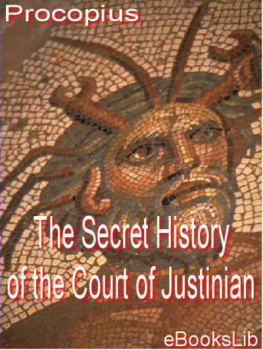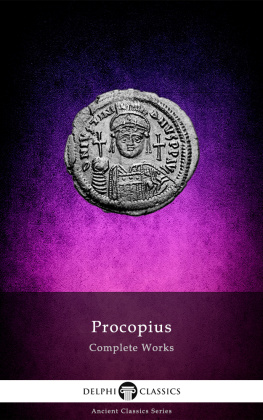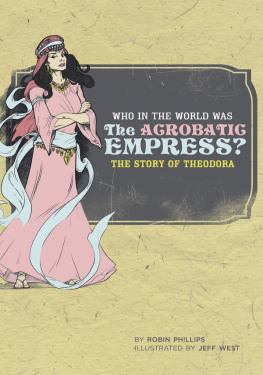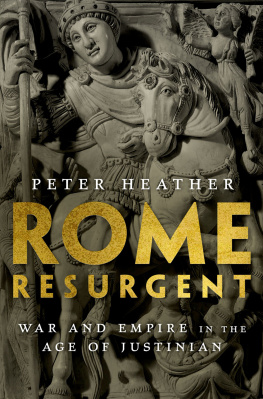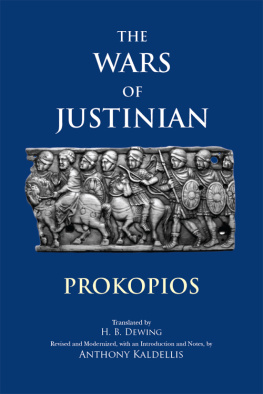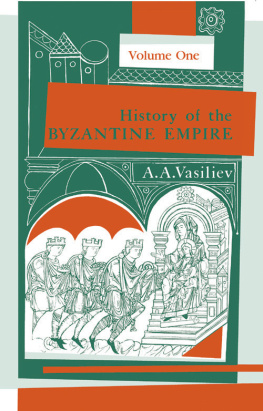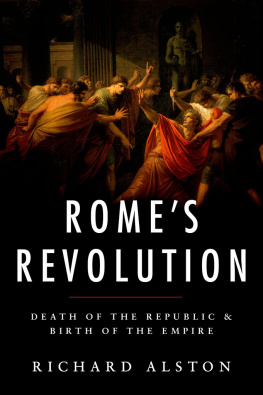
THE SECRET HISTORY
PROCOPIUS was born at Caesarea, the great city built by Herod on the coast of Palestine. We do not know the date: it was probably ad 500 or a little before. In 527 he was appointed private secretary and legal adviser to Belisarius, whom he accompanied on his first three campaigns, in Persia, Africa and Italy. When Belisarius, after capturing Ravenna, was recalled to Byzantium, Procopius went with him, and it is probable that when in the next year Belisarius was again sent to the eastern front his secretary once more accompanied him. But twelve months later, in 542, he was certainly back in the capital, where he witnessed the terrible plague which visited that city. We do not know whether he was with the general during the years of his second campaign in and around Italy, or what he did with his time, apart from literary work, during the remaining years of his life. The date of his death is not known, but he may have outlived Justinian. From Procopius pen three works have come down to us, commonly known as the History of the Wars, the Buildings and The Secret History.
G. A. WILLIAMSON was born in 1895 and was a Classical Exhibitioner at Worcester College, Oxford, graduating with a First Class Honours degree. He was Senior Classics Master at Norwich School from 1922 to 1960. He also translated Josephus: The Jewish War (1959) and Eusebius: The History of the Church (1965) for the Penguin Classics. He died in 1982.
PETER SARRIS was born in 1971 and educated at St Albans School and Balliol College, Oxford, graduating with a Double First. He was elected a Fellow of All Souls College, Oxford in 1993, and is now University Lecturer in Medieval History and a Fellow of Trinity College, Cambridge.
PROCOPIUS
The Secret History
Translated by G. A. WILLIAMSON and PETER SARRIS
with an Introduction and Notes by PETER SARRIS
PENGUIN BOOKS
PENGUIN CLASSICS
Published by the Penguin Group
Penguin Books Ltd, 80 Strand, London WC2R 0RL, England
Penguin Group (USA) Inc., 375 Hudson Street, New York, New York 10014, USA
Penguin Group (Canada), 90 Eglinton Avenue East, Suite 700, Toronto, Ontario, Canada M4P 2Y3
(a division of Pearson Penguin Canada Inc.)
Penguin Ireland, 25 St Stephens Green, Dublin 2, Ireland
(a division of Penguin Books Ltd)
Penguin Group (Australia), 250 Camberwell Road, Camberwell, Victoria 3124, Australia
(a division of Pearson Australia Group Pty Ltd)
Penguin Books India Pvt Ltd, 11 Community Centre, Panchsheel Park, New Delhi 110 017, India
Penguin Group (NZ), 67 Apollo Drive, Rosedale, North Shore 0632, New Zealand
(a division of Pearson New Zealand Ltd)
Penguin Books (South Africa) (Pty) Ltd, 24 Sturdee Avenue, Rosebank, Johannesburg 2196, South Africa
Penguin Books Ltd, Registered Offices: 80 Strand, London WC2R 0RL, England
www.penguin.com
First published in Penguin Classics 1966
This revised translation first published 2007
Translation copyright G. A. Williamson, 1966
Introduction and Notes, and revisions to the translation, copyright Peter Sarris, 2007
All rights reserved
The moral right of the editor and translator has been asserted
Except in the United States of America, this book is sold subject to the condition that it shall not, by way of trade or otherwise, be lent, re-sold, hired out, or otherwise circulated without the publishers prior consent in any form of binding or cover other than that in which it is published and without a similar condition including this condition being imposed on the subsequent purchaser
9780141915845
Contents
Introduction
Of the literary forms and traditions that the modern world owes to the ancient Greeks, perhaps none has done quite so much to shape contemporary intellectual attitudes as the writing of history. To seek to understand the causes and origins of the world around us, to explain the evolution of that world in rational terms and to appreciate and empathize with the complexity and frailty of the human condition, irrespective of the race, creed, or class of the individuals concerned, are key characteristics of the modern Western mind that stem directly from the Greek historiographical perspective. History, in short, was one of the great glories of Greek culture, and of all the historians to have written in Greek, Procopius of Caesarea stands out as one of the greatest.
Procopius is our primary literary source for the reign of the sixth-century Byzantine (or Eastern Roman) Emperor Justinian I (52765), whose period of rule stands out from the pages of Roman and Byzantine history for its energy, ambition and forcefulness. From his imperial capital at Constantinople (Byzantium), Justinian sought to restore Roman rule to the provinces of Africa, Italy and Spain, which had been lost in the fifth century to military usurpers and barbarian invaders. At the same time, he faced a belligerent foe to the east in the form of the ancient empire of Sasanian Persia. At home, Justinian set about the codification and reordering of the inherited tradition of Roman law and the restructuring of provincial government. Religious affairs also demanded his attention, as the imperial Church increasingly found itself wracked by bitter disputes over the nature of the relationship between the Human and the Divine in the person of Christ.
In spite of the vast detail of historical evidence concerning Justinians reign to be found in the legal compilations which he ordered to be produced, the large number of documentary sources that survive from his period of rule (albeit mostly preserved in the sands of Egypt) and the rich vein of archeological evidence, Justinian is nevertheless known to us chiefly through the writings of Procopius, who, by contrast, emerges as a relatively shadowy figure. Of Palestinian origin, he was born in the city of Caesarea, presumably around the turn of the sixth century. He clearly received an excellent education in the Greek classics, although where we do not know. The quality of his education would suggest that he was probably born into a relatively wealthy family. In addition to Greek he is likely to have had a fair amount of Latin and presumably some Aramaic or Syriac (the indigenous language of the region). He is usually described in the sources as a jurist or legal advocate a rhetor. The first post we know that Procopius held was as assessor (military legal secretary) to the general Belisarius, whom he accompanied on campaign against the Persians between 527 and 531. In the year 5334, Procopius again travelled alongside Belisarius as the latter led the Byzantine reconquest of Vandal North Africa. Procopius remained in North Africa under the general Solomon from 534 to 536, in which year he once more joined Belisarius, this time on his Italian campaign. Procopius remained in Italy until at least 540, by which point he would have spent a good thirteen or fourteen years on the military front line, witnessing direct active service. In the year 5423 he found himself in Constantinople, where he witnessed at first hand the advent of bubonic plague the first onslaught of this disease in the history of the Mediterranean. Thereafter his movements are unknown. In the early 560s we do hear of a Procopius who served as Urban Prefect of Constantinople, but whether he is to be identified with Procopius the historian is far from clear.
Procopius account of the battle of Dara between Belisarius and the Persians in 530 is the first eye-witness account of a battle written by a Roman author since Ammianus Marcellinus in the fourth century.


